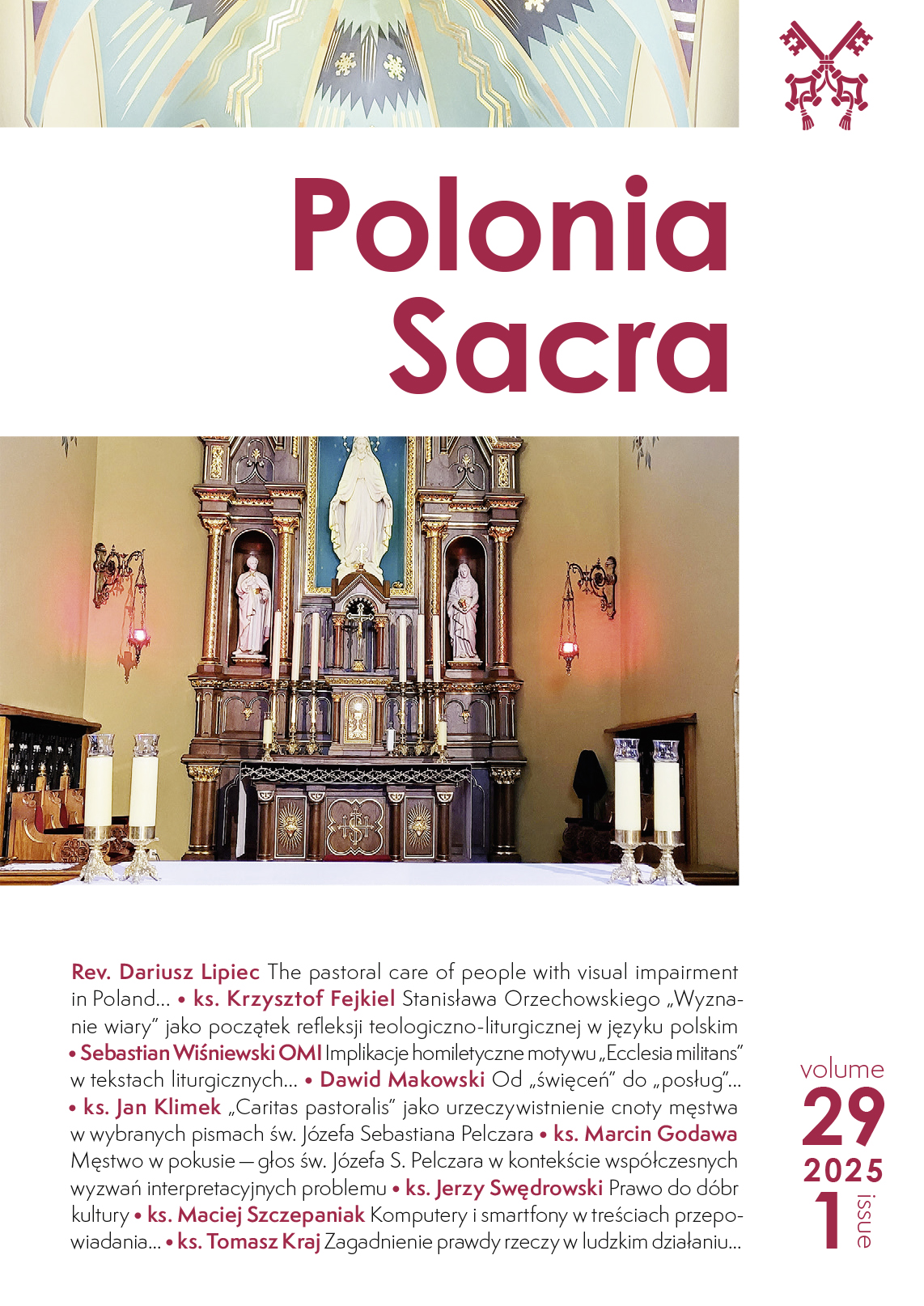The truth of things in human action. Theological consequences
DOI:
https://doi.org/10.15633/ps.29109Keywords:
the truth of things, metaphysics, God, modern philiosophyAbstract
This is a study in the field of fundamental moral theology. The method used is the so-called theologization of morality (Paweł Góralczyk), which is based on a philosophical analysis of an ethical (moral) phenomenon, then supplemented with theological data and explanation. The paper is devoted to the role of metaphysics in moral reasoning, where the truth of things plays a primary role. The aim of this study is to show what was the reason for omitting this truth and its effects in morality (i.e. for the moral life of man). Each thing (understood as Roman res) contains the intention of its creator/Creator. The rationality of moral behavior requires its consideration, which, however, limits the freedom of certain human choices. The solution to this “difficulty” was the removal of metaphysics from the mainstream of philosophy which was done by modern philosophy. In its place, an ontology was introduced. The paper shows the effects of this change (metaphysics — ontology) in morality and its theological consequences. The basic difference between metaphysics and ontology is that metaphysics gets to know a thing (its certain depth: nature, meaning, value, teleology) and ontology is a human reflection on the conditions for the existence of things. It is an a priori reflection, based solely on the human reason. In ontology there is a tendency to redefine already existing things. The author puts forward the thesis that such a change (metaphysics — ontology) has a significant impact on morality, especially where the influence of Christianity on human behavior disappears.
References
Bajor W., Gruchoła M., Mit „ciemnego” średniowiecza we współczesnym dyskursie społecznym, „Roczniki Kulturoznawcze” 11 (2020) nr 4, s. 71–116, https://doi.org/10.18290/rkult20114-4.
Góralczyk P., Główne nurty teologii moralnej po Vaticanum II, „Collectanea Theologica” 62 (1992) nr 1, s. 57–69.
Jan Paweł II, Mężczyzną i niewiastą stworzył ich, Città del Vaticano 1986.
Jan Paweł II, Encyklika Fides et ratio.
Judycki S. P., Rozdział XIII: Realizm i idealizm, wersja robocza: maj 2007, https://www.academia.edu/22257272/Realizm_i_idealizm (25.06.2024).
Kowalczyk S., Klasyczna filozofia prawdy a koncepcja wiedzy obiektywnej Karla R. Poppera, „Roczniki Nauk Społecznych” 51 (2023) nr 1, s. 9–22, https://doi.org/10.18290/rns2023.0014.
Kraj T., Katolik wobec pluralizmu etycznego na przykładzie bioetyki. Studium teologicznomoralne, Kraków 2023.
Krąpiec M. A., Czym jest filozofia klasyczna?, „Roczniki Filozoficzne” 45 (1997) z. 1, s. 156–165.
Maryniarczyk A., Metafizyka a ontologie. Próby przezwyciężania metafizyki i ich paradoksy, Lublin 2015.
Melina L., La conoscenza morale. Linee di riflessione sul Commento di san Tommaso all’Etica Nicomachea, Roma 1987.
Pieper J., The Truth of All Things, w: J. Pieper, Living the Truth, San Francisco 1989, s. 5–106.
Pieper J., Happiness & Contemplation, Indiana, South Bend 1998.
Possenti V., Powrót do bytu. Pożegnanie z metafizyką nowożytną, Lublin 2020.
Simon Y. R., Maritain’s Philosophy of the Sciences, w: Philosopher at Work. Essays by Yves R. Simon, red. A. O. Simon, Oxford 1999, s. 21–40.
Simon Y. R., The Concept of Work, w: Philosopher at Work. Essays by Yves R. Simon, ed. A. O. Simon, Oxford 1999, s. 7–19.
Slade F., Was Ist Aufklärung? Notes on Maritain, Rorty, and Bloom With Thanks But Not Apologies to Immanuel Kant, w: The Common Things: Essays on Thomism and Education, ed. D. McInerny, DC, Washington 1999, s. 48–68.
Tatarkiewicz W., Historia filozofii, t. 2, Warszawa 1958.
Turoldo F., Polemiche di metafisica. Quattro dibattiti su Dio, l’Essere e il Nulla, Venezia 2001.
Downloads
Published
Issue
Section
License
Copyright (c) 2025 Tomasz Kraj

This work is licensed under a Creative Commons Attribution 4.0 International License.
Authors who publish in this journal agree to the following terms:
- Authors retain the copyright and full publishing rights without restrictions and grant the journal right of first publication with the work simultaneously licensed under a Creative Commons Attribution 4.0 International License that allows others to share the work with an acknowledgement of the work's authorship and initial publication in this journal.
- Authors are able to enter into separate, additional contractual arrangements for the non-exclusive distribution of the journal's published version of the work (e.g., post it to an institutional repository or publish it in a book), with an acknowledgement of its initial publication in this journal.
- Authors are permitted and encouraged to post their work online (e.g., in institutional repositories or on their website) prior to and during the submission process, as this can lead to productive exchanges, as well as earlier and greater citation of published work (See The Effect of Open Access).

